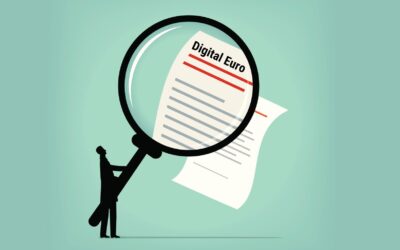The digital euro
Upgrading money to the digital age
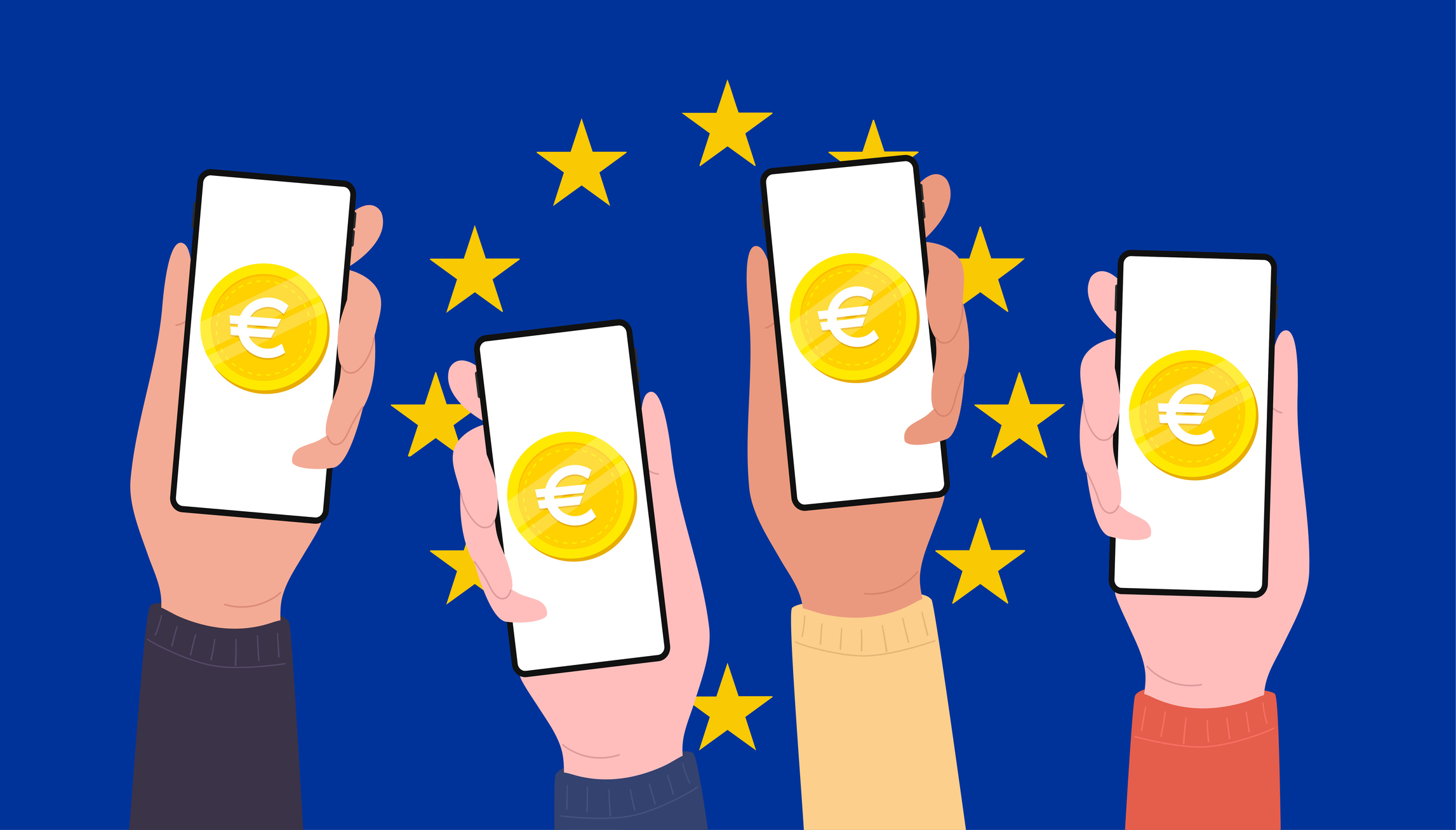
The digital euro is an electronic system of payments and transactions that the European Central Bank (ECB) is currently considering introducing. It is an opportunity for the ECB to provide people with a public digital alternative to private bank deposits. Positive Money Europe advocates for a digital euro that is universally accessible, free of costs and privacy compliant. Furthermore, it should not replace cash: the possibility for us to use banknotes and coins should be protected.
Besides hoarding cash under a mattress, people currently have little choice but to use commercial banks to hold their savings, receive their salaries and make daily payments. The money in our bank accounts exists only as virtual money, and actually constitutes a debt from the bank towards its customers.
In contrast to the private bank money created by commercial banks, public money issued by central banks is an inherently stable form of money. Physical cash (banknotes and coins) is currently the only form of public money that people can use — it is the only payment system that is accessible to everyone, even for those who don’t have a bank account. The ECB, as well as other central banks around the world, is now considering the introduction of a digitised version of public money: the digital euro.
We believe that the digital euro should:
- Be universally accessible.
- Be free of cost for users.
- Have a clear ECB branding.
- Bring resilience to the payment system, ensuring that the core legal and technical infrastructure of the digital euro is public and functions independently of any private system.
What is the digital euro?
The digital euro is a payment system that would provide a universally accessible and safe electronic form of public money, offering people a real alternative to private bank money. In essence, a digital euro would ensure that the Eurozone continues to provide money as a public utility service, instead of letting private companies run our money system. It should have the same properties as cash, but in a digital format.
What are the potential benefits of a well-designed public digital euro? It could:
- Reduce our dependence on profit-seeking banks, thereby improving the stability of the financial system. People could count on a safe and resilient public alternative to private money — the digital public money would indeed be risk-free, since central banks cannot go bankrupt.
- Improve the accessibility of the financial system. Involving a diverse range of intermediaries that provide the digital euro — including non profit and public entities such as public banks, postal networks, local administrations and even national central banks themselves — would facilitate the accessibility of the payment system. Today, on the contrary, the main financial intermediaries, such as commercial banks, are highly selective toward their customer base.
- Force the banking system to be more ethically responsible and competitive, as a consequence of people having more freedom to manage their own money, and of banks receiving fewer implicit public subsidies, for instance, in the form of deposit guarantees and bailouts.
- Provide the ECB with more direct tools to implement its monetary policy, for instance, by passing on interest rates directly to digital euro accounts, or through direct money transfers to people (so-called helicopter money).
Will cash disappear in the future?
Coins and banknotes are a valuable public utility service; however, it is being threatened by the growing use of contactless cards, mobile apps and cryptocurrencies, as well as by many bank branches closing down ATMs.
Most people also rely on private money because physical cash is not convenient for keeping large sums and making high-value transactions, and cannot be used to pay digitally.
Privately issued money represents 86% of the total money currently in circulation in the real economy. With a decline in the use of cash, there is an increased risk that private financial companies such as commercial banks will become more and more powerful in our money system.
Money is a public good and must remain so — preserving access to, and use of, cash, as well as developing a digital alternative to private bank money through a digital euro, are two key ways to ensure this.
What approach are the EU institutions taking?
Whether the digital euro lives up to its significant potential very much depends on technical details which are going to be defined in the coming months. However, so far, the ECB’s plans to introduce a digital euro are disappointingly unattractive, and overly protective of the vested interests of commercial banks.
The ECB is considering introducing a cap on the amount of digital euros one can hold — mainly to address financial instability concerns raised by the banking sector, and to avoid a massive migration from bank deposits to digital euros. Yet, we are not aware of any research that proves this would lead to financial instability. Limiting the amount of digital euros that we can hold would prevent the digital currency from becoming an effective safe store of value, greatly limiting its potential and risking it becoming unattractive to people.
Overall, it seems that the ECB wants to introduce a digital euro in a way that does not challenge the current privileges of the banking sector. Indeed, the central bank currently plans to create a digital euro infrastructure whereby supervised intermediaries — mainly commercial banks — play a central role, even in its distribution.
Last but not least, rather than inviting a broad range of stakeholders and openly exploring the potential of a public digital euro, the ECB has so far mainly sought advice from private finance professionals.
It is crucial that we get democracy involved in this process. The European Commission recently published its position on the digital euro, which represents a very welcome first step towards a democratic debate among European institutions, civil society and financial organisations.
Unlike the ECB, the European Commission clearly envisages that public entities which are open to anyone — such as local or regional authorities, or post offices — should also be involved in the distribution of the digital euro. Furthermore, it has also put forward the proposal to have an offline version of the digital euro, which would ensure the resilience of the payment system in case of outages due to cybersecurity attacks or extreme weather events.
At Positive Money Europe, we are joining forces with other civil society organisations to open up the dialogue on the digital euro and to advocate for an accessible, attractive, privacy-friendly, public digital currency that improves the functioning of the financial system.
Latest news on digital euro
Why is the banking lobby afraid of a digital euro?
Over the next few weeks, the European Parliament will negotiate and vote on legislation for the digital euro. This new form of money could transform the way Europeans handle payments, savings and investments.
The digital euro can still be remedied: here is how
On 28 June 2023, the European Commission released its long-awaited proposal for a digital euro. This proposal kickstarted a phase of political negotiations that should, all things being equal, lead to the adoption of a regulation of the first Eurozone central bank digital currency (CBDC). On 18 October 2023, the European Central Bank (ECB) announced that it was concluding its two-year investigation phase of the digital euro and moving towards the preparation phase.
The digital euro: will policymakers choose team people or team banks?
The current proposal on the digital euro is a missed opportunity. However, it can still be remedied by the EU co-legislators. The European Parliament and European Council can still choose team people by ensuring that the digital euro has very similar benefits to public money (cash) today, that it is usable for people and that people can access it through non-profit/public intermediaries.
Why should we introduce a digital euro?
Money as a Commons
A digital euro would ensure that we don’t lose the public utility of cash as a public payment system.
Financial inclusion
Groups financially excluded from the current banking sector, such as unbanked people and other vulnerable groups, would have access to a safe digital form of public money.
Safety of payments systems
A digital euro would provide a secure, standard and interoperable digital payment instrument managed by the ECB.
Seigniorage income
Issuing a public digital currency would maintain governments’ seigniorage income, regardless of the future use of physical cash.
Technological efficiency
Instead of relying on intermediaries such as banks and clearing houses, money transfers and payments could be made in real time, directly from the payer to the payee.
Banking competition
Digital euro accounts would compete with bank deposits and thus increase competition between banks to attract customers, for example by offering remunerated deposits.

Improve monetary policy
A digital euro scheme could constitute a new channel for monetary policy transmission and facilitate direct money transfers to people (so-called helicopter money).
Financial stability
A public digital euro would be safer than traditional bank deposits because it is a liability of the central bank, which cannot go bankrupt. The digital euro is an opportunity to reduce the moral hazard of the banking sector and improve its stability overall.
Join the campaign
As a supporter, you’re at the heart of everything we do. We’d love to keep you updated about our exciting work and the ways you can help, including campaigns and events that you might be interested in. We promise never to sell or swap your details and you can change your preferences at any time. To do so, simply call +32 2 880 04 34 or email info@positivemoney.eu
what they say about public digital currency
“Central banks should issue their own digital currencies to replace a crisis-prone banking system.”
“I believe we should consider the possibility to issue digital currency”
“A digital currency would remove the need for complex banking regulation”
Further resources
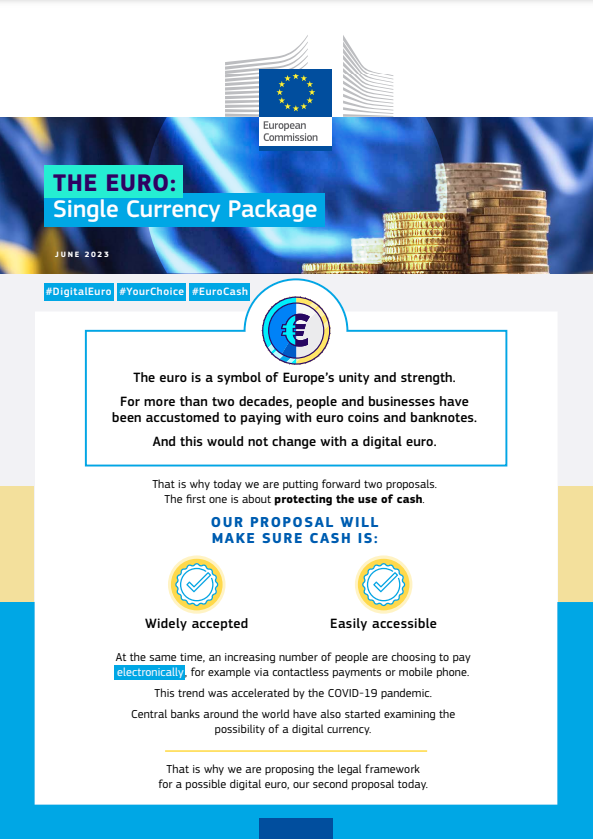
The digital euro: what you need to know about the EU Commission's proposal (June 2023)
The European Commission released in June 2023 its long-awaited proposal for a digital euro, representing a significant milestone in the digitalisation of public money. This development sets the stage for a democratic debate, as the project shifts from the investigation phase conducted by the European Central Bank to the chambers of the European Parliament and the Council.
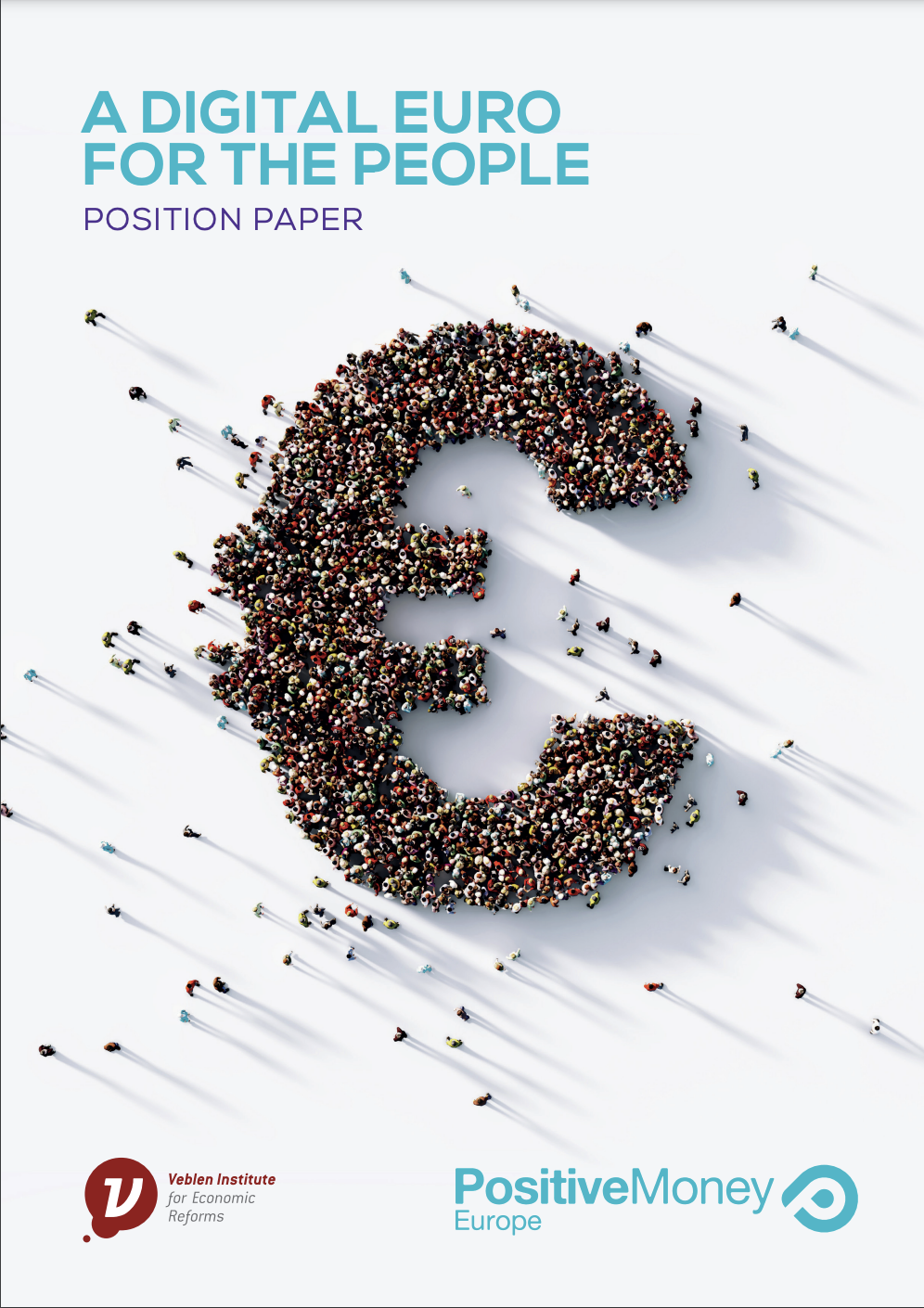
A digital euro for the people: position paper (June 2023)
The digital euro presents an opportunity to reimagine our monetary system in a way that prioritises the interests of people and society. Together with the Veblen Institute, we have published our position paper to contribute to the design and development of a digital currency that truly serves people as a public good.
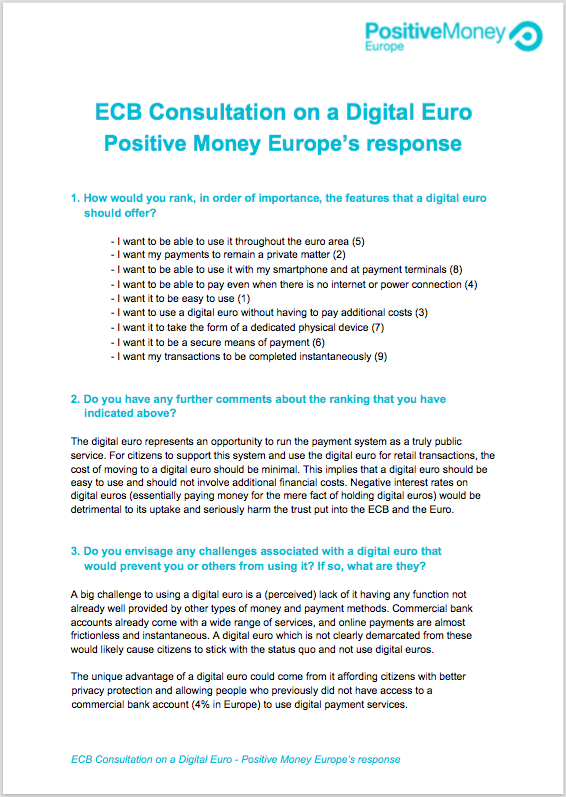
Digital Euro - Positive Money Europe's survey response (January 2021)
Responding to a consultation launched by the European Central Bank on the future introduction of a digital euro, Positive Money Europe outlines how a digital euro could be designed so it truly benefits people.
A digital euro would be the digital equivalent of cash, and the ECB is currently preparing for its potential implementation. The survey included questions on the challenges associated with a digital euro, the role of banks, the managing of the quantity of digital euros and the role organisations who responded could play.
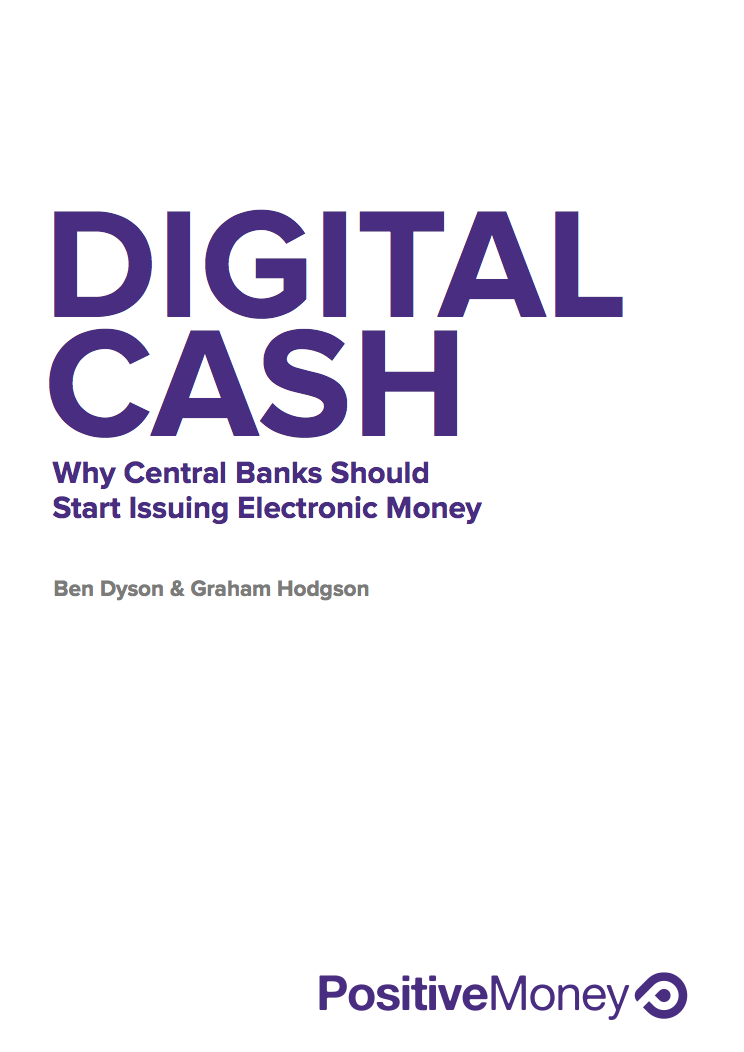
Why Central Banks should start issuing electronic money (2015)
With the impending ‘death of cash’ and the rise of digital currencies (such as Bitcoin), there are strong arguments for central banks to start issuing “digital cash” – an electronic version of notes and coins (also known as a central bank digital currency). But this raises a number of questions: how would central banks get new digital cash into the economy, and how would the public use it? What would the advantages be? And would there be any impact – positive or negative – on financial stability?


